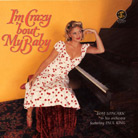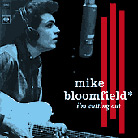![[SoundStage!]](../sslogo3.gif) The Vinyl Word The Vinyl WordBack Issue Article |
May 2003 Found on Vinyl: Eden Atwood, Tom Loncaric and His Orchestra, and Mike Bloomfield Blues and jazz have been intertwined throughout much of their history. It sometimes seems almost impossible to think of one without the other, so close has been their connection. I’ve received three albums recently that cover portions of each genre, from the sultry jazz vocals of Eden Atwood’s Waves [Groove Note GRV1012-1], to the swing-era stylings of Tom Loncaric and his Orchestra on I’m Crazy 'Bout My Baby [TL Records HAR22377], to the electric blues of guitarist Mike Bloomfield’s first studio recordings now released on I’m Cutting Out [Sundazed LP 5105].Not only do these albums cover a multitude of styles, they come from three diverse yet similar labels. The diversity derives from Groove Note’s strict issuance of newly recorded material, Sundazed's dedication to reissuing great music from the 1960s, and TL Records' philosophy of planning their releases with the vinyl LP as the foremost consideration. Their similarity is the result of vinyl being a primary format for all three, and as audiophiles (and music lovers) we can be thankful for these traits, for they mean that there will always be something new and different for us to get excited about.
Atwood's singing on Waves stands in stark contrast to that of some of today's well-promoted young jazz singers. She has unerring ability to get inside a song, which is missing from the work of many contemporary jazz lionesses. Another point to consider: Many times when a young singer comes to public attention, we attempt to categorize her by comparing her style to that of past stars. While Eden Atwood’s vocals do call to mind other singers, it’s extremely difficult to pin those influences down. She sounds like Eden Atwood and not someone else, and she deserves to be acknowledged for it. Just listen to Atwood’s voice as she sings "O Pato" and the chances she takes with this tune. You get the feeling that Ms. Atwood feels very, very comfortable with these songs. As always with a Groove Note album, sound takes a share of center stage -- the sonics here are to die for. The soundstage is both wide and deep, with each instrument in its own acoustic space. The tonal quality of those instruments is first-rate also. Cunliffe’s piano has the size and heft of the real thing, as does Oles’ bass, but it is Anthony Wilson’s guitar that steals the show. Whether rhythm or lead, the sound of his hollow-body electric (a Gibson maybe?) was there on the left front of the stage for me to hear, weaving in and out of each song on which he plays. And as usual from Groove Note, the album was pressed on high-quality 180-gram vinyl and came with Groove Note’s companion 45rpm bonus album, allowing comparison of the two formats. To me, 45 is to 33 1/3 what SACD is to CD -- it sounds more real, as if the musicians were in the room with me. What was a bit unusual was the amount of surface noise I heard, not what I’d expected. This was after I’d cleaned the LP on my trusty VPI 16.5 record-cleaning machine using the Disc Doctor fluid. I could never quite figure out if it was tape noise (likely) or a pressing problem (unlikely), but it never interfered with the music or the replication of detail, though it was noticeable between cuts from my listening chair.
The orchestra is made up of Loncaric on piano, Andy Conlin drums, Kyle Neely on guitar, Dave Roof or Paul Keller on bass, and Peter Klaver on tenor sax -- and King’s vocals (with added help on side two from cornet and trumpet). While this might seem a tad small for an orchestra, believe me, these guys sound like a larger group, and can they swing! The musicianship is impeccable, the song selection first-rate, and the recording quality is up to any audiophile's demanding standards. The drums are snappy, the bass deep and woody, the brass and reeds full blat and honk, and the vocals 3-D. Each instrument occupies its own acoustic space, thereby creating the feeling of being in the recording studio. I do have three issues in regard to this album's production. Some of the instruments change locations from track to track, thereby making it hard to get a fix on them sonically. Also, there's a bit too much of a studio feel as opposed to a live, in-the-same room sound. Finally, I wish the band had let loose a bit more -- you know, could have been a little jazzier. But as it is, I’m more than happy with what’s here, and I look forward to hearing the next album from both Loncaric and TL Records. For a first release from a new label, this is an impressive album.
These tracks, until recently unreleased, were the undertaking of producer John Hammond, whose work with the likes of Billie Holiday, Count Basie, Charlie Christian, Aretha Franklin, and Bob Dylan make his association with Bloomfield all the more interesting. But it’s Bloomfield himself who will capture your imagination. There are quite a few white musicians who attempt to play the blues, but there are very, very few who actually understand what the blues are all about and can make use of that in their playing. Bloomfield was one of those rare few. Listen to either of the takes of "I Got My Mojo Working" and then listen to any of the Bloomfield original compositions. You won’t hear much of a difference. Bloomfield not only listened and appreciated the blues, he took the time to understand the wherefores and whys of it. I’m Cutting Out has an innocent rawness that serves to draw me in, making me feel the music. If Bloomfield weren’t in such rare form here, Musselwhite’s harmonica would steal the show; as it is, he plays a close second fiddle to one of the greats. Sound quality is pretty raw, so it’s perhaps no wonder Columbia allowed these sides to lie in the can all these years. The vocals in particular are rough and thin-sounding. Fortunately, the music is of such quality that it overcomes the poor production. The Sundazed vinyl is, as usual, fabulous. It’s thick, flat, and quiet. These three albums represent a cross section of musical styles and are, in turn, a coming out party (Bloomfield), a continuation and building of a career (Atwood), and the summation of a style (Loncaric). Two are of reference quality (Atwood and Loncaric), while the other is sonically raw but musically rich. All are worth your money. ...John Crossett
|
|
![[SoundStage!]](../sslogo3.gif) All Contents All ContentsCopyright © 2003 SoundStage! All Rights Reserved |
 Eden Atwood’s Waves
looked to be right up my alley. Atwood has already built a commendable career with several
well-thought-of jazz vocal CDs on the Concord label. But here was a chance to hear her on
vinyl, my favorite truly hi-rez format in a style that seems to be getting less and less
publicity these days: Brazilian jazz. Backed by musicians the caliber of Bill Cunliffe on
piano (he created all of the arrangements too), Darek Oles on bass, Joe LaBarbera on drums
(he was Bill Evans' final drummer), Anthony Wilson on guitar, Pete Christlieb on tenor sax
and flute (his résumé includes work with Steely Dan), and Scott Breadman on percussion,
Ms. Atwood floats, improvises, and interprets her way through songs as diverse as
Jobim’s "Girl From Ipanema" to Lennon and McCartney’s "Fool On
The Hill," and makes them both swing and uniquely her own -- an attribute that can
only come with talent and time.
Eden Atwood’s Waves
looked to be right up my alley. Atwood has already built a commendable career with several
well-thought-of jazz vocal CDs on the Concord label. But here was a chance to hear her on
vinyl, my favorite truly hi-rez format in a style that seems to be getting less and less
publicity these days: Brazilian jazz. Backed by musicians the caliber of Bill Cunliffe on
piano (he created all of the arrangements too), Darek Oles on bass, Joe LaBarbera on drums
(he was Bill Evans' final drummer), Anthony Wilson on guitar, Pete Christlieb on tenor sax
and flute (his résumé includes work with Steely Dan), and Scott Breadman on percussion,
Ms. Atwood floats, improvises, and interprets her way through songs as diverse as
Jobim’s "Girl From Ipanema" to Lennon and McCartney’s "Fool On
The Hill," and makes them both swing and uniquely her own -- an attribute that can
only come with talent and time.  TL Records is a brand-new
label, and Tom Loncaric and his Orchestra’s I'm Crazy 'Bout My Baby is their
initial release. This really is infectious music. It’s 1940s-era pop-swing-jazz at
its finest. Just look at a sampling of the songs recorded here: "Sheik of
Araby," "I Get A Kick Out of You," "Body and Soul," and
"Please Don’t Talk About Me When I’m Gone," represent some of that
period's biggest hits. Singer Paul King brings the vocal stylings of Frank Sinatra to mind
(and on "I Get a Kick…." he even sounds like him). But Sinatra never
received the recording quality that TL Records gives to this album.
TL Records is a brand-new
label, and Tom Loncaric and his Orchestra’s I'm Crazy 'Bout My Baby is their
initial release. This really is infectious music. It’s 1940s-era pop-swing-jazz at
its finest. Just look at a sampling of the songs recorded here: "Sheik of
Araby," "I Get A Kick Out of You," "Body and Soul," and
"Please Don’t Talk About Me When I’m Gone," represent some of that
period's biggest hits. Singer Paul King brings the vocal stylings of Frank Sinatra to mind
(and on "I Get a Kick…." he even sounds like him). But Sinatra never
received the recording quality that TL Records gives to this album. Mike Bloomfield
could play the guitar, and the blues in particular. He never quite got the public respect
he deserved during his short life -- he died in 1981 at the age of 38 -- but his peers
held him in the highest regard, and not just as a musician. I’m Cutting Out
was recorded just prior to his recording with the Butterfield Blues Band and his
appearance on Bob Dylan’s ground-breaking Highway 61 Revisited. It shows just
how much this 22-year-old had assimilated the blues of Muddy Waters, B.B. King and
Lightning Hopkins. Joined here by a very young Charlie Musselwhite on harmonica, Mike
Johnson on guitar, Sid Warner on bass, Norman Mayell on drums and Brian Friedman on piano,
Bloomfield traverses some great blues tunes, from Waters’ "I Got My Mojo
Working," Walter Jacobs' "Last Night," and Willie Dixon’s
"Lonesome Blues," to originals like the title track, "The First Year I Was
Married," and "I’ve Got You in the Palm of My Hand."
Mike Bloomfield
could play the guitar, and the blues in particular. He never quite got the public respect
he deserved during his short life -- he died in 1981 at the age of 38 -- but his peers
held him in the highest regard, and not just as a musician. I’m Cutting Out
was recorded just prior to his recording with the Butterfield Blues Band and his
appearance on Bob Dylan’s ground-breaking Highway 61 Revisited. It shows just
how much this 22-year-old had assimilated the blues of Muddy Waters, B.B. King and
Lightning Hopkins. Joined here by a very young Charlie Musselwhite on harmonica, Mike
Johnson on guitar, Sid Warner on bass, Norman Mayell on drums and Brian Friedman on piano,
Bloomfield traverses some great blues tunes, from Waters’ "I Got My Mojo
Working," Walter Jacobs' "Last Night," and Willie Dixon’s
"Lonesome Blues," to originals like the title track, "The First Year I Was
Married," and "I’ve Got You in the Palm of My Hand."